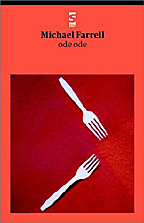Michael Farrell
Salt Publishing ($12.95)
by Aaron McCollough
Among younger poets today, the methods for channeling Frank O'Hara are manifold and often quite beautiful. They are seldom as remarkable, however, as the performance Michael Farrell pulls off in ode ode. The book is crammed—that's the only word for it—with language. Elisions and forced breaks, two of Farrell's favorite tools, make for jarring, sometimes difficult reading, but they also produce much of the book's poetic payoff. As implied by the glossolalic repetition of "ode" in the title, the book's labor is measured in productive juxtapositions; its ambition is to turn cramming into singing.
Narrative dilation and fast-talking whimsy are two O'Hara trademarks so common on the American scene as to seem ubiquitous. Farrell, an Australian poet, handles these qualities with aplomb; his work recalls O'Hara at his more opaque, providing just the corners of a narrative rather than the entire frame. This frees him to glide towards the lyric intensity of "at my maddest id ask / anyone if they wanted my / thoughts catch 22 lead / ing back to death by / bullets sid vicious beat / frank sinatra to it nice"—gorgeous jumpy lines from one of the book's many serial poems.
Other voices (familiar and strange) emerge in Farrell's work, as well: Yoko Ono competes for space with Elizabeth Bishop, Guns 'n' Roses, W.H. Auden, and the Booyaa Tribe; The Pretenders square up with Gertrude Stein and Tammy Wynette. Farrell's ear is as warm as an analog synthesizer, and ultimately he makes every one of these voices his own. Consider the strange narrative integrity and sonic beauty of these lines from "the me to i phrasebook":
the angels that walk only soar or
fall to the extremely self aware
sharing blood with you a harp sound bears
me hoops break the battles have happened
the hold me written in the book by
helps you cry like a seraph
basing this phrase on the fish that live
in the brook on the buns tourists drop
in talking like a mirror to an
artist of knifings paranoia
hurt understanding her breath was art
my breath was at best research or work.
These lines, and many more like them, make ode ode a charming and promising exercise in the oft-forgotten delights of the lyric mode. Moreover, Farrell's palate for experiment and tradition rewards multiple readings. It should feel fresh for a long time to come.
Click here to purchase this book at your local independent bookstore

Rain Taxi Online Edition, Fall 2003 | © Rain Taxi, Inc. 2003

